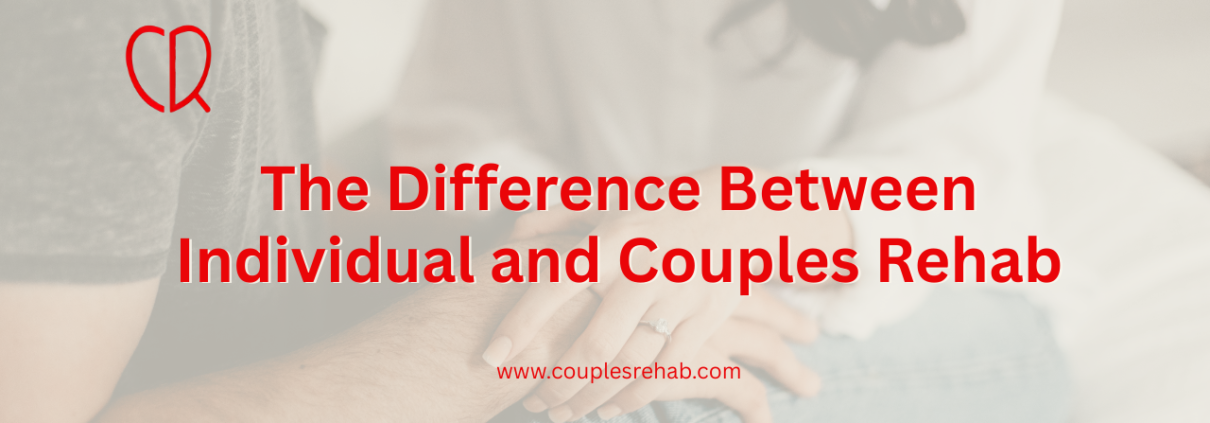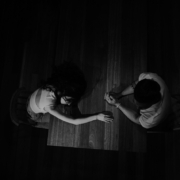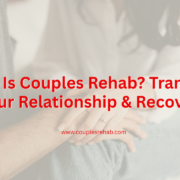Addiction doesn’t discriminate—it disrupts lives, shatters dreams, and strains even the strongest relationships. When substance use disorder enters a relationship, it creates a complex web of challenges affecting both individuals. Deciding between individual rehabilitation and couples rehab represents one of the most consequential choices facing those ready to reclaim their lives from addiction.
The journey toward sobriety involves numerous pivotal decisions, with treatment approach selection among the most significant. Individual rehab has traditionally been the standard, focusing exclusively on the person struggling with substance use. However, couples rehab has emerged as a powerful alternative that addresses both addiction recovery and relationship dynamics simultaneously. This guide explores the distinct characteristics, benefits, challenges, and appropriate applications of both rehabilitation approaches.
Drawing from clinical experience at Couples Rehab in Huntington Beach, we’ll provide insights to help determine which path might best support lasting recovery for your unique situation.
Understanding Addiction Treatment Fundamentals
Addiction treatment encompasses evidence-based approaches designed to help individuals overcome substance dependence and develop healthier coping mechanisms. Modern rehabilitation programs integrate medical care, psychological counseling, behavioral therapies, and support systems to address addiction’s multifaceted nature.
Treatment typically begins with detoxification—safely managing withdrawal symptoms—followed by rehabilitation programs addressing addiction’s psychological aspects through therapeutic modalities including Cognitive Behavioral Therapy (CBT), Dialectical Behavior Therapy (DBT), and trauma-informed approaches.
What sets effective treatment apart is personalization—tailoring approaches to address each person’s unique circumstances, substance use patterns, co-occurring conditions, and personal goals. This personalization extends to treatment format, including whether rehabilitation occurs individually or within a relationship context.
Individual Rehab: Core Components and Approach
Types of Therapy Used in Individual Rehab for Drug and Alcohol Addiction
Individual rehabilitation centers on treating the person with substance use disorder without direct partner involvement. This traditional model creates a focused environment where clients can explore their addiction without relationship dynamics potentially complicating treatment.
Cognitive Behavioral Therapy stands as a cornerstone, helping clients identify distorted thinking patterns that fuel substance use while developing healthier thought processes. Motivational Interviewing helps resolve ambivalence about change by strengthening personal motivation and commitment to specific goals.
Individual counseling sessions provide personalized attention from addiction specialists who help clients explore personal trauma, underlying mental health conditions, and emotional factors contributing to substance use. Skills development focuses on practical tools for maintaining sobriety, including stress management techniques, communication skills, and relapse prevention strategies.
Benefits of Choosing Individual Rehab Over Couples Rehab
Individual rehabilitation offers distinct advantages for certain situations. Personal growth opportunities abound as clients focus exclusively on their healing journey without balancing relationship dynamics simultaneously. This concentrated self-work often enables deeper introspection and more rapid progress in early recovery.
Privacy considerations make individual treatment appealing for many, as clients needn’t share personal revelations with partners. This confidential environment often facilitates greater honesty about past behaviors or current struggles that someone might hesitate to reveal with their partner present.
Individual rehab particularly excels when one partner remains actively using substances, when relationship dynamics might impede recovery, or when personal trauma requires focused attention before addressing relationship issues.
Challenges Faced in Individual Rehabilitation for Substance Abuse
Despite its benefits, individual rehabilitation presents certain challenges. Potential isolation issues can arise as clients work through recovery without their partner’s direct involvement. This separation sometimes creates emotional distance that requires additional work to bridge following treatment.
Missing the relationship component means that while individual treatment addresses personal substance use effectively, it may not adequately prepare someone for reintegrating into their relationship with new sobriety skills. Relationship dynamics that potentially contributed to substance use remain unaddressed in traditional individual treatment.
Couples Rehab: Core Components and Approach
Specific Therapy Approaches in Couples Rehab for Substance Use Disorders
Couples rehabilitation treats addiction within the relationship context, recognizing that relationships significantly influence substance use patterns, and conversely, substance use profoundly impacts relationships.
Behavioral Couples Therapy (BCT) forms the foundation of many couples rehab programs, combining individual addiction treatment with relationship counseling. Studies show couples completing BCT together demonstrate higher abstinence rates and relationship satisfaction compared to those in individual treatment alone.
Systems-based approaches examine how couple dynamics either support recovery or enable continued substance use. Communication skill development focuses on teaching healthy expression of needs, active listening, and conflict resolution—skills often damaged during active addiction.
Shared recovery planning involves couples developing aligned strategies for maintaining sobriety, including creating substance-free environments, establishing supportive routines, identifying mutual triggers, and planning appropriate responses to high-risk situations as a team.
Advantages of Couples Rehab Compared to Individual Treatment
Couples rehab offers unique benefits unavailable in individual treatment models. Healing relationships alongside addiction addresses the considerable relationship damage typically occurring during active addiction. Building mutual support systems allows partners to learn how to effectively support each other’s sobriety while respecting appropriate boundaries.
Addressing codependency issues—unhealthy patterns where partners enable addiction or derive self-worth from caretaking roles—happens directly within couples treatment. Developing shared sobriety strategies prevents common post-treatment conflicts about recovery-related decisions that often trigger relapse when partners have different understandings of recovery requirements.
Difficulties and Potential Drawbacks of Couples Rehab Programs
Despite its advantages, couples rehab presents unique challenges. When one partner demonstrates less commitment to treatment or sobriety, the process becomes significantly more challenging. Different motivation levels can create frustration and uneven progress.
Managing different recovery paces often proves challenging, as partners rarely progress through recovery stages at identical rates. Couples rehab may be contraindicated in relationships with active domestic violence, severe emotional abuse, or when one partner actively sabotages the other’s recovery efforts.

Key Differences: Side-by-Side Comparison
Treatment Focus and Philosophy
Individual treatment philosophy centers on self-focused healing, emphasizing personal responsibility for recovery without relationship dynamics complications. Couples rehab embraces a relationship-centered recovery philosophy, viewing addiction as both a personal and relational issue requiring attention to both dimensions for sustainable recovery.
Therapeutic Approaches
Individual therapy typically employs targeted interventions addressing personal substance use patterns, trauma histories, and mental health needs without relationship dynamics complexity. Couples approaches integrate relationship-specific methodologies alongside addiction treatment, teaching partners to communicate effectively about recovery needs and support each other’s sobriety without enabling behaviors.
Research supports both approaches depending on circumstances. Individual treatment shows stronger outcomes when relationship factors don’t significantly influence substance use. Conversely, couples approaches produce superior long-term outcomes when both partners commit to the process and relationship preservation represents a significant recovery motivation.
Recovery Outcomes
Studies indicate couples treatment results in higher abstinence rates (61% versus 28% in some studies) and greater relationship satisfaction compared to individual treatment alone when both partners fully engage. Couples completing treatment together demonstrate lower relapse rates at 12-month follow-up compared to those participating in individual treatment only.
Long-term relationship outcomes differ significantly between treatment models. Approximately 60% of couples where only one partner receives addiction treatment end their relationships within two years of treatment completion. Conversely, couples completing treatment together report higher relationship satisfaction and significantly lower separation rates.
Cost Comparison of Individual Rehab Programs and Couples Rehab Centers
Individual rehabilitation generally costs between $15,000-$30,000 for 30-day residential programs. Couples rehabilitation typically costs 25-40% more than individual treatment when calculated per couple, though significantly less than two separate individual programs.
While most insurance plans cover individual addiction treatment, coverage for couples programs varies significantly between providers. Many couples programs offer component-based billing to maximize insurance reimbursement possibilities.
When Is Individual Rehab the Better Option?
Individual rehabilitation clearly represents the appropriate choice for single individuals seeking recovery, when one partner isn’t ready for treatment but the other desperately needs help, or in new or unstable relationships that lack foundation for intensive couples treatment.
When domestic violence or severe abuse exists within the relationship, separate individual treatment represents the only safe option. When individual mental health needs require primary focus—such as severe co-occurring disorders requiring intensive psychiatric intervention—individual treatment typically provides the appropriate level of specialized care.
Situations Where Couples Rehab Is Recommended
Couples rehabilitation offers the optimal approach when both partners demonstrate commitment to recovery and relationship healing. When codependency significantly factors into relationship dynamics, couples treatment provides direct intervention for these unhealthy patterns.
Relationship preservation as a priority indicates couples treatment, particularly for marriages with children or long-term committed partnerships. When both partners use substances, couples rehabilitation offers comprehensive intervention addressing the substance-using ecosystem within the relationship, preventing the common scenario where one partner’s recovery destabilizes when the other continues using.
The Integrated Approach at Couples Rehab
At Couples Rehab in Huntington Beach, we’ve developed a philosophy balancing individual needs within couples treatment. Our integrated approach provides both partners with individualized assessment and treatment planning while simultaneously addressing relationship dynamics affecting recovery outcomes.
Our specialized programs address various substance use disorders through targeted interventions specific to substances including alcohol, opioids, stimulants, and polysubstance use. Dual diagnosis capabilities enable simultaneous treatment of co-occurring mental health conditions alongside addiction and relationship issues.
Comprehensive aftercare and continuing support options include graduated step-down programs, alumni services, and family integration sessions designed to reinforce treatment gains. These continuing care components significantly improve long-term outcomes for couples completing our program.
Making the Decision: Assessment Factors
When considering treatment options, ask targeted questions: How significantly does the relationship influence substance use patterns? Does substance use represent a coping mechanism for relationship distress? Would addressing relationship dynamics alongside addiction treatment increase recovery motivation?
Professional assessment recommendations typically consider relationship duration and stability, substance use patterns within the relationship context, safety concerns, and individual treatment history when recommending treatment formats.
Intervention specialists increasingly recognize the value of involving both partners in the intervention and treatment engagement process, even when only one meets criteria for substance use disorder. This inclusive approach often increases treatment engagement regardless of which treatment model ultimately proves most appropriate.
In some situations, hybrid approaches combining elements of both individual and couples treatment provide the optimal solution. These customized programs might include primarily individual treatment with couples sessions integrated at specific intervals, or couples-focused treatment with additional individual sessions addressing personal needs requiring private therapeutic space.
Conclusion
The difference between individual and couples rehab extends far beyond simply who attends treatment sessions. These distinct approaches represent fundamentally different conceptualizations of addiction and recovery—one viewing addiction as primarily an individual issue requiring personal intervention, the other recognizing addiction’s inherently relational dimensions requiring relationship-focused treatment.
Making an informed choice between these approaches requires honestly assessing relationship stability, substance use patterns, safety considerations, and recovery goals. For some situations, individual treatment clearly provides the appropriate starting point, while others benefit tremendously from integrated couples approaches.
Both approaches demonstrate effectiveness depending on circumstances and implementation quality. The critical factor lies not in which approach works “better” universally, but rather which approach best addresses your specific situation and needs.
If you’re considering treatment options for yourself or your relationship affected by addiction, we encourage professional consultation to determine the most appropriate approach. The team at Couples Rehab in Huntington Beach specializes in comprehensive assessment helping individuals and couples identify optimal treatment pathways.
FAQs
How do success rates compare between individual and couples rehab programs?
Research indicates couples-based treatment shows higher abstinence rates (approximately 60% versus 30% in some studies) when both partners fully engage in treatment. Individual treatment demonstrates better outcomes when relationship factors don’t significantly influence substance use or when relationships remain highly unstable.
Can couples attend some therapy sessions together during individual rehab?
Many individual rehabilitation programs offer family programming allowing limited partner participation, typically 1-2 days during treatment. However, these programs fundamentally differ from true couples rehabilitation which integrates relationship therapy throughout the entire treatment process.
What happens if one partner relapses during couples rehab?
Relapse during couples treatment triggers comprehensive reassessment of treatment approaches for both partners. Programs typically intensify individual support for the relapsing partner while providing specialized guidance helping the non-relapsing partner maintain appropriate boundaries without enabling continued use.
Is couples rehab more expensive than individual treatment?
Couples rehabilitation typically costs 25-40% more than individual treatment when calculated per couple, though significantly less than two separate individual programs. Couples treatment often proves more cost-effective long-term when considering potential costs of relationship dissolution following individual-only treatment.
Can couples with different substances of choice benefit from couples rehab?
Absolutely. Couples programs effectively treat partners using different substances by combining substance-specific interventions with relationship therapy addressing the shared relationship dynamics influencing all substance use regardless of substance type.
How long does a typical couples rehab program last?
Most couples rehabilitation programs range from 30 to 90 days for residential treatment, with research suggesting that longer treatment durations generally produce better outcomes. Many couples benefit from a step-down approach that begins with residential treatment followed by intensive outpatient programming, extending the total treatment engagement to 4-6 months for optimal results.
Do insurance companies cover couples rehab programs?
Insurance coverage for couples rehabilitation varies significantly between providers. While most insurance plans cover components of addiction treatment, coverage specifically for the relationship therapy aspects may be limited. Many couples rehab facilities offer component-based billing that separates addiction treatment (typically covered) from relationship counseling (often less coverage) to maximize insurance benefits.
What types of addiction can be treated in couples rehab?
Couples rehab programs effectively address all substance use disorders, including alcohol dependency, opioid addiction, stimulant use disorders, marijuana dependency, and polysubstance use. Additionally, many couples programs have specialized tracks for behavioral addictions like gambling or sex addiction when these co-occur with substance use or impact the relationship similarly.
How does couples rehab address codependency issues?
Couples rehab specifically targets codependency through specialized therapeutic interventions that help partners identify enabling behaviors, establish healthy boundaries, and develop independent identities while maintaining connection. Unlike individual treatment which often addresses codependency theoretically, couples programs allow real-time identification and modification of these patterns within the actual relationship context.
What happens after couples rehab is completed?
After completing structured treatment, couples typically transition to a comprehensive aftercare plan that includes ongoing couples therapy, individual counseling as needed, participation in recovery support groups (both addiction-focused and relationship-oriented), regular check-ins with treatment providers, and gradual reintegration into work and social environments with newly established boundaries and communication skills.











